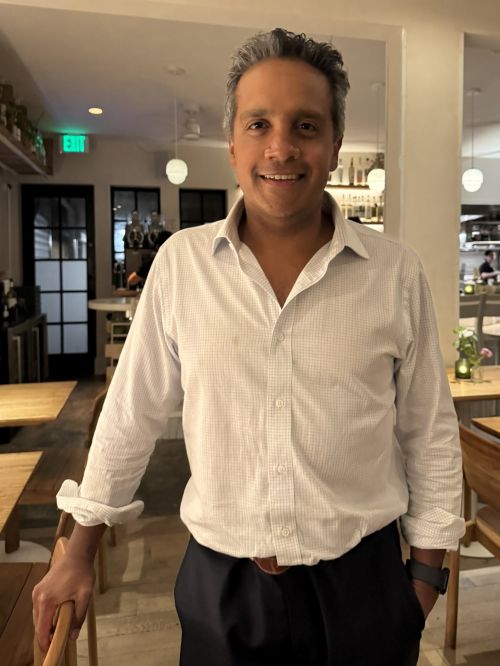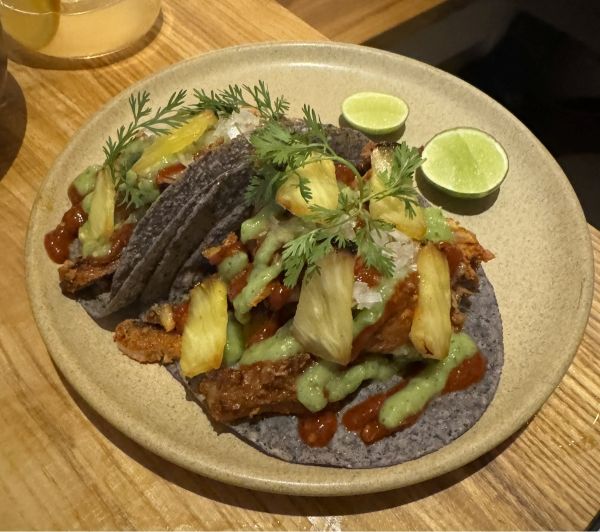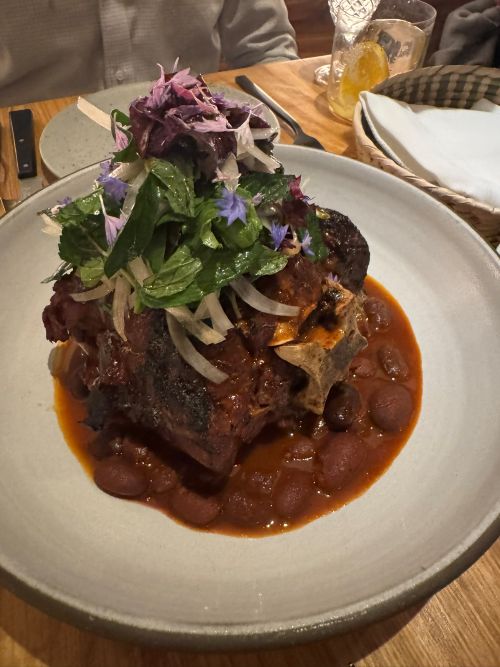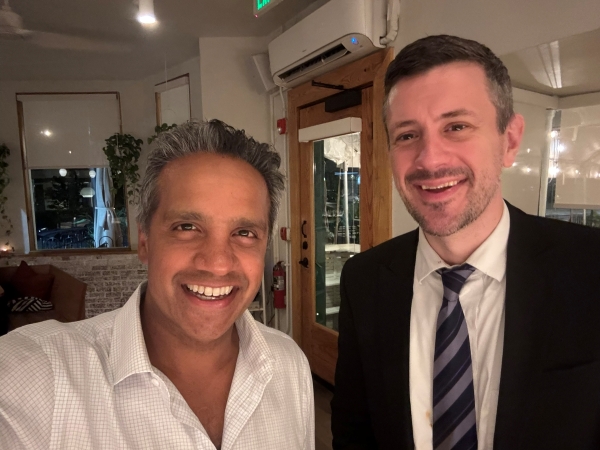WASHINGTON, D.C.
June 16, 2025
STRANGER: Manu Raju
LOCATION: Pascual, 732 Maryland Avenue NE, Washington, D.C.
THEME: Dinner with CNN’s chief congressional correspondent and Inside Politics Sunday anchor
“Every minute of the day I’m doing something,” says Manu Raju.
As CNN’s chief congressional correspondent, he’s often stalking the corridors of power in Washington, D.C., chasing scoops and breaking exclusives. The energetic 45-year-old is also the anchor for the cable news channel’s Inside Politics Sunday politics show. And while his work dominates much of his time, every other spare minute is dedicated to his wife and twin kids.
Over dinner at popular Capitol Hill venue Pascual, Manu shares how just the past Saturday he juggled junior golf, soccer tournaments, a birthday party and more for the children, meetings for his Sunday show, and responding to news in real time as it develops. “So I was basically doing something from six in the morning until past midnight, then I was up again at 4.30 in the morning to get ready for the show at 8am.
“So you’re getting like four hours of sleep a day on average?” I ask.
“Six on a good day,” he shoots back with a laugh.
If the work tires Manu out, he doesn’t show it in word or action.
Ahead of our meeting he’s lightning-fast replying to my messages to plan it. And in person, he projects an alert, good-humored presence, speaking with a deep, confident voice and – perhaps to be expected given his profession – a genuine interest in others. He peppers me with almost as many questions as I have for him during the two-plus hours we’re at dinner, showing off the inherent curiosity that has helped his reporting career flourish.
I got to witness the start of what has been a roughly 20 year trajectory from a novice D.C. journalist to a leading CNN figure, because Manu and I worked together for a couple of years at the trade publication Inside EPA. It’s an in-the-weeds newsletter uncovering what’s really going on at the Environmental Protection Agency, aimed at lawyers, advocates and members of Congress and their staff so they can stay ahead of the news about the EPA.
From the pages of Inside EPA to an audience of millions with CNN, Manu has kept a notoriously hardworking pace because of the thrill of scoring agenda-setting news.
“There’s still nothing like the first time you hear or see something that is an unbelievable development. And when the world hears this, they’re going to react in a way that will blow their minds. Or at least change their understanding to some extent. When you’re the first person to give them something they did not know – that’s a great feeling,” he says.
Whether it’s a senator’s comment, a House member’s aside, or anything else, breaking news is Manu’s fuel. “It’s adrenaline, it really is.”
This dedication also means he’s rarely off the clock, although he tries to make Fridays his day off to rest. Even when we meet for dinner, he’s debating having to send a text message to a source seeking feedback on a comment he got from a top Republican senator. In the interests of protecting Manu and his work, I’ll have to keep further details off the record.
Seconds later, a colleague texts that the situation is being handled. “So that’s the challenge of the work-life balance because it’s like you say, you know, news is constant, right?”
But news wasn’t always a constant in Manu’s life.
I ask for a potted life history, but first we have to try the starter. Everything’s shared at Pascual, where some of the always outstanding dishes are as layered as some of Manu’s reporting. He takes a bite of the taco al pastor starter — salsa cruda, salsa morita, roasted pineapple — and nods with approval. “Oh man, that’s good.” I concur.
Back to the bio in-between bites. Born in Downers Groves, Illinois, he grew up in the nearby city Darien, about 30 minutes from Chicago. “My parents immigrated there from India in the 70s. I lived in the same house until I went to college in Wisconsin. I grew up in a very white, Polish, Catholic, Italian Catholic neighborhood. I was the first generation in this country, and really tried to assimilate into American culture,” says Manu.
Living a self-described “all-American lifestyle,” Manu quickly developed a love of sports, becoming a fast fan of the Chicago Cubs baseball team, Bears football team and Bulls basketball team. In high school, he played football and basketball and ran track.
During his childhood, he also led a youth group at the local Hindu temple. He said his experience running things led to him choosing business administration to study at college.
Manu enrolled at the University of Wisconsin-Madison after being awed by the campus and its fun atmosphere. His first brush with journalism came about because he wanted to do some extracurricular activities. Manu’s brother – the director and writer Sharat Raju – had written about sports for his college’s newspaper in Michigan and told him it was a great way to meet people and watch games. “He had a great experience and said I should do the same.”
So Manu offered his services to the college newspaper in Madison. “That was my freshman year. I wrote my first story, and I remember it was terrible.”
Editors worked their magic and turned the copy into something printable, making Manu realize he had plenty to learn about reporting and writing. “But that’s every journalist’s story, right? So I got more involved. And by my sophomore year, a position opened up as the associate sports editor, so I applied and got it, and started covering more sports.”
He adds, “By the time I graduated, I remember I was thinking about combining journalism and sports and business,” although still unsure what that might look like.
A jobs fair changed his course. Watching 50 people compete for the same low-paying role with an obscure baseball team in the middle of nowhere, Manu realized it wasn’t the right road for him. Instead, he shifted his full focus to building a career in journalism.
There’s a brief pause as the rest of our dishes arrive: aguachile verde (shrimp, striped bass, avocado, serranos), chayote salad (sunflower seeds, guajillo oil, Asian pears), and the star of the night — lamb neck barbacoa with ayacote beans, salsa cruda, and herbs. We’re in quick agreement that everything is beyond delicious, and incredibly filling.
“You have to finish this,” Manu says, nudging the last bit of lamb in my direction. I don’t need much convincing. While I dig in, he picks up the story of his journalism journey.
Showing the self-starting drive that has defined his career, Manu applied for a job on the sports desk at an NBC station in Los Angeles — and flew out to the city before they’d even decided whether to hire him. “So then they had to kind of hire me,” he says with a laugh.
But he started to realize that writing about sports might lessen his love for them. “I like sports as an escape from life, I can watch a game and forget about all the other issues. You can’t escape if you’re covering it all day and then come home. So that was a big decision.”
Manu took another internship, this time general news for an NBC affiliate in Madison. He debated trying to work his way up the ranks at the station, or moving. And he looked at D.C., because by then his father had relocated to the city for his work. Manu moved in with them, applying for, and getting rejected from, many reporting jobs. He started thinking about graduate school, and went with friends on a two-month backpacking trip to Europe.
But he kept applying, and managed to score an interview at Inside EPA’s parent company Inside Washington Publishers when he got back. “I only knew a percentage of policy and political reporting. And I certainly didn’t know any environmental policy.”
His inexperience showed in an interview with the company’s founder Alan Sosenko. “He asked me to bring ‘the issues’ to the interview. I studied up on everything I could about environmental policy — turns out he meant the newsletter issues.”
Manu laughs at the recollection, but clearly Sosenko saw something in the aspiring reporter, hiring him in 2002 to work for Inside EPA.
“I have to hand it to them because that job was my first education in Washington,” he says. “How to cover the place. How to report. How to develop sources. How to understand very complex subject matter and write it in a way that people can understand.”
The job involved covering hearings in Congress on the EPA and related topics, trying to catch lawmakers in hallways to get a few coveted minutes or just seconds with them, asking a question and praying for a news-making exclusive in response. This work taught Manu that he wanted to cover more of politics and with less of a heavy environmental focus.
In early 2005, he took a job reporting on Congress for Congressional Quarterly. His innate ability to break news saw him constantly generating headlines, and his career picked up a brisk pace. Later jobs included covering the Senate for The Hill and a similar job at Politico.
“Every job was another learning experience, you take one of set of experiences from one job to another,” he says. “From Inside EPA I learned Washington, the environmental policy, developing sources, covering federal agencies. CQ I learned covering Capitol Hill, the legislative process, developing sources on the committee – the staffers are the ones with the real power. At The Hill it was leadership politics, the players and personalities.”
By September 2015, Manu – still at Politico – was a known quantity in D.C., often appearing on Sunday television political talk shows. And he’d gotten a taste of the adrenaline of TV political news as moderator of debates for Colorado governor and senator a year earlier.
“When they dodge a question live it’s much different dodging a question on camera versus on print. It has a whole different impact. People can see it and understand it. When you write that this person declined to comment, it’s a lot different,” he says. So when a position opened up at CNN, Manu took it, and he’s since worked hard to climb the network’s ladder.
What he’s tried to avoid on the way up is becoming the story.
Impartial to a fault, Manu nevertheless shares that “about 2%” of the public that approach him might tell him CNN sucks, that it makes fake news. “And that’s people on the left and right. So if I’m getting attacked from all sides, that means I’m doing my job right.”
But 98% of the people who stop him just want to get a selfie. Given that he’s often found wandering the Capitol, he’s easy to spot there. But viewers have asked for pictures in some unexpected locations, including Rome and Machu Picchu.
Other lighthearted viral moments include his on-screen fight with a cicada, and a hilarious video on The Colbert Show interviewing Sen. Cory Booker (D-PA) after a landmark speech.
Manu’s reporting has nevertheless become the story, whether for a throwaway viral moment or something more serious, more than once.
He was on the Hill during the January 6, 2021, insurrection. Manu recalls the day clearly, from the first security warning through to the alarm that the protesters had breached the building. Manu was on air in a press room just feet from the mob, though they couldn’t hear him and didn’t try to enter the room.
At one point, he reported gunshots in the building (it would turn out to be when Ashley Babbit tried to break through a door and was shot and killed by the Capitol’s police). Eventually the National Guard took back control of the complex, and Manu was rushed down a secure corridor into a holding area where he stayed with senators, staff and others until it was safe.
“I never felt not secure, but I also realize how naive that feeling was,” he says. “When I walked out later, it smelled like smoke bombs, tear gas, everything had this gray, slippery film. Troops were everywhere because a riot did happen. It was like walking through a war zone. I didn’t realize until I left how much danger we were really in.”
Manu adds that even though it was “a dark day, a true attack on the United States democracy,” he’s not an emotional person so doesn’t dwell deeply on it.
That cool head likely helped with another well-publicized moment in 2020, when he tried to ask then-Sen. Martha McSally (R-AZ) a question about Trump’s pending Senate impeachment trial. The senator dismissed Manu, calling him a “liberal hack.” Video of the encounter quickly made the rounds, garnering tens of thousands of views.
“I don’t want to be the story, I want to cover the story,” says Manu. “And I asked her the most straightforward question about an upcoming vote on whether or not to seek witness testimony and documents. Her person was recording it, they wanted it to go viral. So then it became a whole thing, she was fundraising off it, and to be fair to her, the Democrats raised a ton of money out of it too. The only person who didn’t get anything out of it was me.”
Even when there’s tension with lawmakers or other sources, Manu shrugs it off. “I get so much vitriol, I just tune it out. What is my objective? To get the facts. Getting someone on the record about a position that they don’t want to take. Their voters need to know how their members feel about an issue, and most of the time they don’t want to answer that question.”
He adds, “The media is being purged, the press corps is totally thinned out. So that means there are fewer people covering those delegations. So it means reporters like me, who are up here every single day, have to get these members on the record. And I find a responsibility and a duty to do it. Oftentimes that means asking questions that these members don’t like. Oftentimes it means that. And then it means getting some attacks from their people, their allies, but whatever. Our job is to get them to respond and just report it as it comes.”
He worked hard to develop respectful connections with powerful figures like House Speaker Mike Johnson (R-LA) or former Senate Leader Mitch McConnell (R-KY) but not deep friendships. They’re not out playing golf or breaking bread when the cameras aren’t rolling.
“They view me as a reporter, I view them as a source of information,” he says. “You actually don’t want to become best friends with these people because how do you cover your friend objectively? I think the best relationship is a trusting relationship. So, like, they can trust me for information, that I will present the information fairly.”
Manu adds, “And they also trust me that when I have a negative story about them, or about something they’re involved with, that I’ll give them the opportunity to comment well ahead of time, and that they’ll know exactly what I’m reporting. And it’s going to be fairly representative with not just what the story is, but also their response.”
This approach to down-the-middle reporting on facts have guided him through his more than two decades of working in D.C., and it’s an approach he’ll keep for the future. He speaks proudly of his colleagues in front of and behind the cameras at CNN, underscoring just how much work goes into what might be seconds of news on-screen.
He’s light on answers when it comes to what the next years might hold beyond enjoying his job, although he tosses out some ideas like writing a book (topic yet unknown).
But he’s typically in-depth when reveling in how much the constant quest for scoops means personally and what it represents. “What people don’t see is the amount of work that goes into a story that never sees a light of day. When you’re able to get new information, tell someone something they don’t know about an issue, a person, drive a narrative forward, it’s very fulfilling and very rewarding. It makes all the work worth it.”
As dinner comes to an end, Manu reiterates that he tries to work just as hard at being a good husband and father. He recalls how Father’s Day this year was a Sunday – the day of his CNN show. As the credits rolled on-screen, it showed a picture of Manu’s father and twins, with dad wishing them all a happy day. “I told the kids to watch, and they shrugged and said, ‘Great.’ I asked if they told their friends about it, they said no.”
He lets out another of his hearty laughs. “Kids are never impressed with their parents.”



